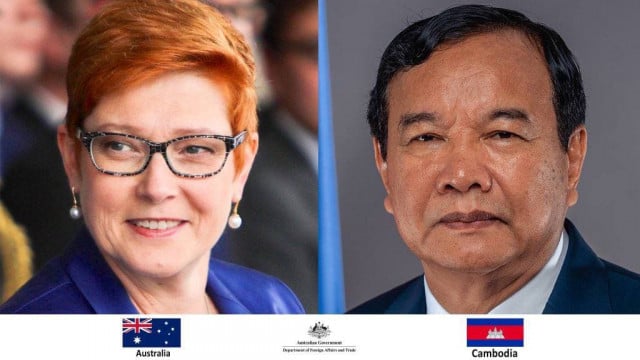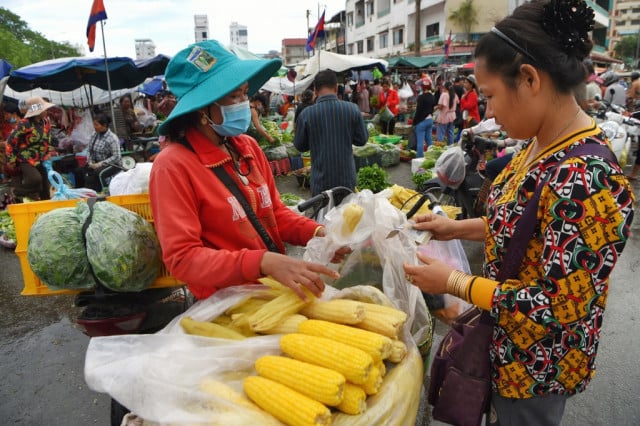Cambodia Shares with Australia its Concerns over AUKUS

- By Sao Phal Niseiy
- October 9, 2021 7:37 PM
As chair of ASEAN in 2022, Cambodia will have to contend with the tension between China and countries of the AUKUS alliance, which includes Australia
PHNOM PENH--Cambodia on Oct. 8 voiced concern over the new trilateral security alliance AUKUS, saying that the government hopes this will not trigger unnecessary and “unhealthy” competition and tension in the region.
During a phone call with his Australian counterpart Marise Payne, Foreign Minister Prak Sokhonn said that the Cambodian government hopes the newly-established security agreement AUKUS concluded by Australia, the United Kingdom and the United States will not drive major-power rivalries and escalate tension in the region, according to a press statement issued by Cambodian Ministry of Foreign Affairs and International Cooperation.
“[Sokhonn] highlighted that Cambodia, as a country which had experienced war, destruction, and suffering for many decades, wishes to see the whole region remain peaceful, stable, and prosperous, and expected that AUKUS will not fuel unhealthy rivalries and further escalate tension,” the statement read.
Sokhonn also encouraged Australia to constructively engage with the Southeast Asian region through ASEAN so that mutual trust and confidence will be built in order to secure an open, transparent, inclusive and rules-based regional architecture, according to the statement.
In response, Marise Payne reassured her Cambodian counterpart that the new security agreement has been set up to promote a peaceful, prosperous and secure Indo-Pacific region.
“Also, the partnership will not be an addition to arm race in the region,” Payne said, the statement read. “As part of the AUKUS, Australia would be able to acquire nuclear-powered submarines to upgrade the capabilities of the Royal Australian Navy.”
Given that Australia would acquire nuclear submarines to boost its military capability, she continued, the country has no intention of wishing to acquire nuclear weapons or establish a civil nuclear capability, she said, adding that the country is committed to the nuclear non-proliferation obligations and to working closely with the International Atomic Energy Agency.
Following the meeting, Payne sent out a tweet saying that Cambodia is an important and long-standing regional partner of Australia, and that both countries shared an interest in a stable and prosperous Indo-Pacific region. “Australia looks forward to supporting Cambodia as ASEAN chair in 2022,” she added.
Is AUKUS capable of countering China?
In mid-September 2021, Australia, the United Kingdom and the United States announced they had concluded the AUKUS security pact that, in addition to enabling Australia to acquire US nuclear submarines, involves cooperation in a wide range of areas including artificial intelligence and other technologies.
The move has been seen by many regional pundits as aiming to counter China’s rising influence. This has also prompted China to condemn the three countries’ agreement, calling it irresponsible behavior that could undermine peace and stability in the region.
Po Sovinda, a PhD scholar at Griffith University in Australia, explained that the new security pact may be less capable of containing the rise of China in the region than providing protection for Australian interests.
“Contrary to popular belief that AUKUS is to contain China, [this] is just a small portion of the whole picture,” he said in an interview via Facebook.
“From the US perspective, it may be the case,” he said. However, from an Australian perspective, AUKUS cannot in any way contain China, and only amounts to a security arrangement that allows Australia to purchase eight nuclear-powered submarines from the US with help from the UK, Sovinda said.
“For Australia, AUKUS is a signal to China that Australia will only stick with the US, and China should reconsider its approach towards Australia like the trade sanctions on Australian products.” Over the last few months, China has imposed economic sanctions on several Australian industries.
However, Sovinda said, it is important to bear in mind that AUKUS may be a starting point through which the US will attempt to involve Australia in its effort to contain China.
Dilemma for Cambodia as ASEAN chair 2022
Despite the fact that AUKUS cannot counter China in any way, Sovinda said, the region has already seen fierce competition between two major powers: China and the US.
“The word ‘unhealthy’ [used by the Cambodian foreign minister] that AUKUS may become is a spot-on assessment,” he said. “What we have seen already is the increasing struggle between China and the US over power.”
From a Southeast Asian perspective and a Cambodian perspective in particular, the trilateral security pact is creating more trouble than opportunities, Sovinda said.
“It is trouble in the sense that it only widens the trust gap between China and the Western countries such as Australia and the US,” he noted, adding that the way in which China will respond is critical to peace and stability in the region.
China has already labelled AUKUS as “Cold War Mentality,” Sovinda said. What the region will witness in the near future is intense security competition and pressure on Southeast Asian states, he said.
“The Southeast Asian states will find it very difficult to stick together in a sense [of] whether to remain silent on the issue or supportive/rejective of AUKUS,” Sovinda stressed.
The countries in the region should anticipate more engagement from Australia in the near future in other areas of cooperation such as trade, he added.
With AUKUS in place and the possible pressures this agreement may cause, there already have been divergent views expressed by the Southeast Asian countries with Vietnam, Singapore and the Philippines in particular being more supportive whereas Indonesia has expressed concerns, Sovinda pointed out.
This being the case, Cambodia as the 2022 ASEAN chair will surely face the dilemma of trying to reconcile the different opinions to manage a unified position regarding AUKUS and the power competition in general, Sovinda concluded.















